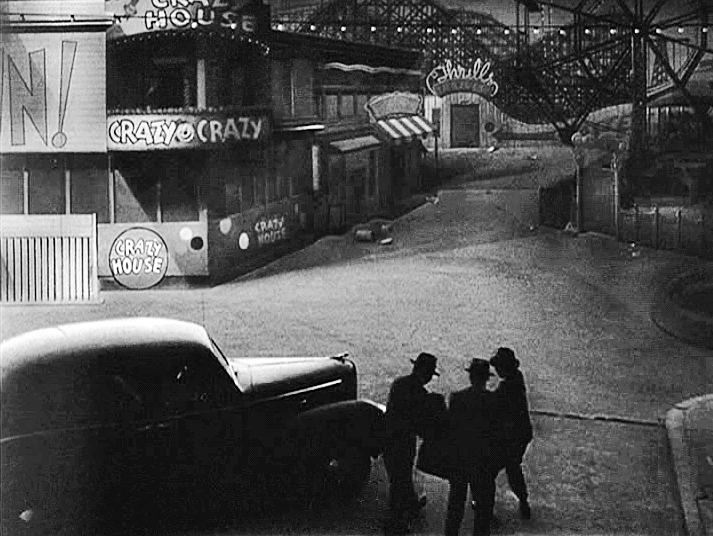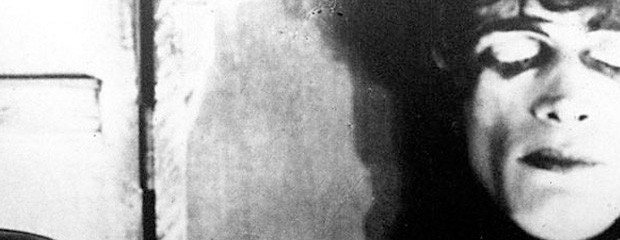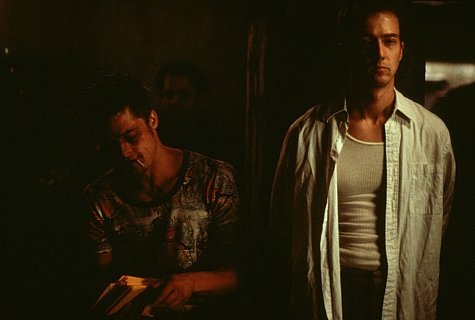Hello Friend.
If Mr Robot made you think of Fight Club more than once, you are most definitely right. The parallel between Mr Robot and Tyler Durden is quite apparent even before the big reveal. So when an instrumental version of “Where is my mind” at the end of the 9th episode started playing, I took it as a confirmation of the link between Fight Club and Mr Robot. (I may or may not have stopped the video, stood up, and started clapping by myself in front of my screen.)
But recently, I have started to see the show under a new light. That of German expressionism.
It all started when I watched The Cabinet of Dr Caligari a few days ago. Its style and themes somehow reminded of Mr Robot. At first, I found that strange. How can a German expressionist silent movie from 1913 remind me of a 2015 anarchist drama about cyber hacking? But I quickly realized that there were in fact many parallels to be drawn:
In the words of Hans Janowitz, the writer of the film, The Cabinet of Dr Caligari “b[ears] the atmosphere of the postwar period”. It’s “an expression of its time [where] the authority of the state [has] gone mad by the misuse of its powers”. (Caligari- The Story of a Famous Story)
Isn’t that one of the main themes of Mr robot? Wouldn’t you agree that Evil corp represents the corporate greed we are so angry against, especially after the recession of 2008? Wouldn’t you go as far as saying that Wall Street or Evil Corp or specifically its CEO Phillip Price are Dr Caligari?
Another common theme between the movie and the show is mental illness. According to Janowiz, this theme is inspired by an anecdote in Carl Mayer’s life. Indeed, Carl Mayer ( who was a co-author of the film), went through “a desperate battle with an official military psychiatrist to whom it was necessary to prove himself mentally deranged” to avoid going to war. These events inspired the authors to touch on the subject. As a result, the main story of The Cabinet takes place in an asylum and at the end, most of the events are revealed to be the fruit of the narrator’s imagination. The twist at the end of the film somewhat explains the expressionist style and the “artsy” mise en scene.
Similarly, the depth of narration in Mr Robot makes us doubt everything we see or hear. Elliot’s constant questions to himself “Is this real?” “Did that just happen?” “Am I crazy?” are just the tip of this iceberg of madness. In fact, the entire show has the mark of Elliot’s gaze. The forth episode “Deamons” where we dive into Elliot’s hallucinations is clearly stating:” Do not ever trust anything elliot says. Ever!” My favorite example however is when Fernando Vera tells Elliot “I’m gonna hug you” when I think he just meant “I’m gonna kill you!”. (We all know how much Elliot hates hugs). This example shows how incredibly distorted and skewed events are by Elliot’s narration.
Wait, so does that mean that Elliot is Cesare? I would argue so.
His numb voice, his frenetic paranoid walk when he is outside, his anti social misunderstood mind, his half open eyes, are perfect to make him the somnambulist of the show. He WAS commanded to kill people wasn’t he? This analogy is not perfect, because Mr Robot asked him to do it and not Evil corp. But it’s just a detail that wouldn’t lead us to discard the hypothesis.
Maybe, a way to reconcile the parallel between Elliot and Cesare with our definition of Dr Caligari would be to argue that Mr Robot (Christian Slater’s character) is also Dr Caligari. Mr Robot embodies the father figure and represents an authority Elliot wants to break free from. Mr Robot is also a man who has gone mad, by the misuse of his hacking power. If you are not convinced, maybe these shots will do the trick:

 All these ideas were floating in my mind when I watched a clip in class from The Lady from Shanghai (1947). This film noir, with its constant voice over reminded me of the show. But that is no surprise really, because Mr Robot has been all I think of lately. However, I didn’t expect to notice some more clues about this German Expressionist theory of mine.
All these ideas were floating in my mind when I watched a clip in class from The Lady from Shanghai (1947). This film noir, with its constant voice over reminded me of the show. But that is no surprise really, because Mr Robot has been all I think of lately. However, I didn’t expect to notice some more clues about this German Expressionist theory of mine.
Indeed, The Lady From Shanghai is most known for its expressionist ending: the notorious mirror scene. Which is the penultimate scene of the film.
It was quite a shock for me to find that, in Mr Robot, the 9th episode (out of 10) is also entitled “Mirrors”.
By then, I just told myself to stop! It seemed like I was starting to make random connections with anything that is even mildly expressionist.
But I realized that this famous mirror scene happens in a funhouse in an abandoned amusement park!


 And if that is not enough, another parallel would be that the reference to China in Mr Robot is as generic, stereotypical and void of any meaning as the one in The Lady From Shanghai.
And if that is not enough, another parallel would be that the reference to China in Mr Robot is as generic, stereotypical and void of any meaning as the one in The Lady From Shanghai.
It may seem like a bit of a stretch but I don’t think that the name White Rose is trivial either. It is actually the name of an intellectual resistance group against Nazi Germany…
The more I think about this theory, the more I think of word associations: Dr Caligari? Mr Robot? That sounds awfully similar to Dr Jekyll and Mr Hyde! The ultimate alter ego/split personality story of all time.The original Fight Club! By now, it is no surprise that many interpretations of the novel are in fact in German expressionist style! Isn’t that a beautiful full circle?
So what does this all mean? can we predict anything from this parallel? I think so.
- Well I think it’s safe to say that since Lady from Shanghai dies, in the last scene of the film in that abandoned amusement park, Tyrell is most definitely dead.

- We can also draw a connection between Jane Olsen, the innocent girl in The Cabinet and Angela. Will Mr Robot hurt her?


- And last but not least, I think the lesson at the end of The Cabinet is that director of the Asylum/Dr Caligari always wins. So I am guessing that season 2 will have E corp reemerge triumphant. It will be as if this whole chaotic anarchist revolution never happened. F Society think that they won, but I doubt they have. The “system” is like a hydra, as soon as you think you cut its head off, it grows another one. After all Phillip Price doesn’t seem to worry the least about the recent events.
So maybe we won’t watch Rome burn after all.


















Amazing. Seriously. I cannot believe how these all fit together while also being their own stories. Maybe the point is that nothing is never new, understood, or what we perceive. I love this post.
LikeLiked by 1 person
Oh Thank you for your comment.
I am glad you are convinced and it’s not just in my head.
While working on this post, I’ve been through some Elliot moments where I doubted my sanity 😛
LikeLiked by 1 person
You and me both…
LikeLiked by 1 person
Oh my god, this was such an amazing read! All these parallels really do make sense, and it would be interesting to hear the show creator’s opinion on these. I wouldn’t be surprised if he drew his inspirations from the movies you mentioned. It just makes too much sense.
I really enjoyed this!
LikeLike
That is so nice of you. I’m really psyched this isn’t just in my head…
If you happen to have Sam Esmail’s email, please do share hahahaha.
LikeLike
With a popular show like that I’m sure he’ll eventually do an AMA on Reddit or something. 🙂
LikeLike
Fingers crossed!
LikeLike
This is such an interesting way of looking at the show and I bet it’s not even the only one. The love I have for Mr. Robot is rooted from the fact that the show has so many layers, it doesn’t allow singular interpretation. It allows THIS to happen, connections that you made, connections between current news and etc. This show truly is remarkable and the more I think about it, the more things I find to think about.
PS: This is probably why I’m writing a new post about the show right now.. and I’m afraid it won’t even be the last one either.
LikeLike
Absolutely agree with you. This shit goes deep! Just today, I was reading about yet another interpretation of the film that also steers away from Fight Club. Check this out: https://medium.com/@andrewarrow/i-figured-out-robot-and-it-s-last-action-hero-d9af6eddfa88
LikeLike
This is a great analysis! The parallels you raise are obscure but you present them in a very convincing way. I have a question for you that the creator has not answered yet: why did the he name the main character Elliot? Any insight?
LikeLike
I don’t know for sure. But if I had to guess I’d say that it has to do with him being one of the “Elite”. Whether he likes it or not, Elliot wants to seem like a vigilante underdog but he is as powerful as those 1% of the 1%. he did take down their empire after all.
The fact that he is one of the Elite traps him in either one of these characters:
Elliot is either better than us and he is going to save us with his hacking super powers. Or he is a pretentious prick who wants to disturb the world order just because he can.
In this video: http://www.usanetwork.com/mrrobot/videos/sam-esmail, Sam Ismail says it himself. Elliot is either a good guy who wants to help people or just a narcissist asshole.
Because of his social anxiety, Elliot always seems to put himself outside of the system. To look at it from a higher place, like the rules don’t apply to him “Look at me, I hate Facebook, I hate corporate America. I don’t play that game. while you, you are sedated, you read the hunger games and you use instagram and you follow people on twitter..”. He walks around judging the mundane citizens that we are and this sense of superiority that grows in him makes him so full of himself. In that same video, Sam Esmail said that the use of off-kilter shots shows the way Elliot sees the world, (from a higher point of view).
In the same time, he seems to genuinely cares about everyone’s destiny and he feels like he should free us all from our debt. He’s the savior, he is the hero. He is the good guy.
So I think the name “Elliot” kind of captures that duality.
It is funny to note however that “ Elliot” also kinda-sorta sounds like “idiot” (Sorry to all the Elliots out there). Maybe the show is using that, to highlight the irony behind his character. He pretends like he doesn’t care, but he totally does.He acts like he is better than us but he isn’t. First thing he does when he meets someone is creep on their Facebook…He hates corporate america and he has a 9 to 5 job, where you have to wear a shirt? Elliot is almost like a middle schooler who can’t hang out with the cool kids in recess, so he pretends like he doesn’t like them and he doesn’t need friends, cause he’s tough guy…
All along, there is been this sense of stolen childhood that’s been floating around. The show seems to be quite self aware of how childish it’s premise is, it’s almost saying “let’s not take this kid too seriously,he misses his daddy, he’s playing with robots and he wants to save the world…” I don’t know exactly how that ties in with the beginning of the comment but I feel like it somehow does.
LikeLiked by 1 person
Very interesting! Thank you 🙂
LikeLiked by 1 person
There are also weird parallels with the movie, Superman III.
I originally posted about the similarities in a Reddit post, as a joke!!! It was a juvenile reaction to reading yet another post comparing Mr. Robot to Fight Club…
…However, others took my post seriously, and the more I thought about it, the more the “coincidences” seemed intentional.
LikeLike
OMG. Love this. It keeps going deeper. How many layers is this thing? See, to reduce the show to just a rip off Fight Club is a big big mistake. Did you see the link in the comments about “Last Action Hero” (1193)
LikeLike
I’ll take a look now.
And yes, the Fight Club comparisons are lazy! Anybody with half a brain would have interpreted the use of the Pixies song, as Esmail saying: “It’s a similar plot, and so what?”… Unfortunately, I think it had the opposite effect on a large number of viewers.
Fight Club wasn’t even an original idea! The concept of multiple personalities acting independently of one another (without the other persona being fully conscious), has been a popular trope in literature, since at least Dr. Jekyll & Mr. Hyde!
Seeing those stills of Caligari in your post, has made me want to watch Metropolis again. I’m certain that there’s lots of comparisons with that movie too!
LikeLike
Oh Good point. I have not seen Metropolis yet. But I am planning to this W.E. Now I’m more curious…
LikeLike
Fantastic.. love what you’ve done with your blog recently (direction & style).
LikeLike
Thank you for your comment Jim. I appreciate it.
LikeLiked by 1 person
Reblogged this on … but I digress.
LikeLiked by 1 person
Thank you for sharing 😀
LikeLiked by 1 person
Thank you for sharing 😀
LikeLike
excellent review of Mr Robot, I can honestly say I’ve never seen most of the movies you compare to Mr. Robot but maybe I should. 🙂
LikeLiked by 1 person